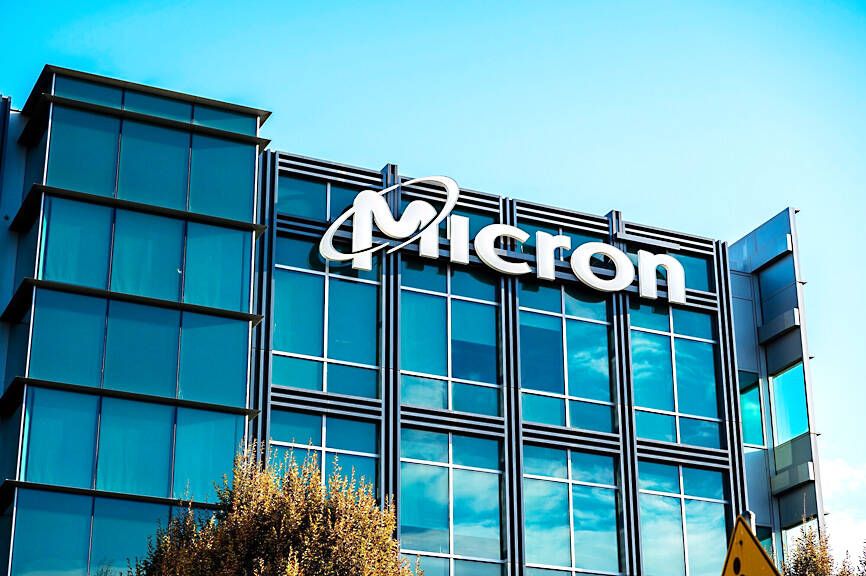Micron Technology Inc has settled a high-profile intellectual property (IP) theft lawsuit with a key, state-backed Chinese rival amid the US company’s efforts to mend ties with Beijing.
Micron said it has reached a global settlement agreement with Fujian Jinhua Integrated Circuit Co (福建晉華).
“The two companies will each globally dismiss their complaints against the other party and end all lawsuits between them,” a Micron spokeswoman said in an e-mail, declining to provide further details.

Photo: Bloomberg
The settlement comes months after the Chinese government in May barred Micron’s chips from “critical infrastructure” over cybersecurity concerns. The US has also been working with allies to prevent Beijing from obtaining the most advanced semiconductors and the latest chipmaking technologies.
Micron in June said that about half of its sales tied to China-headquartered clients might be affected by Beijing’s move, representing a “low-double-digit percentage” of its global revenue. The US firm said at the time about one quarter of its global revenue came from businesses based in China and Hong Kong.
Micron appears to have attempted to pacify Beijing, including promising to invest another 4.3 billion yuan (US$606.2 million) in its Chinese chip-packaging plant and sending its chief executive officer, Sanjay Mehrotra, to visit the world’s second-largest economy.
In 2017, Micron sued Fujian Jinhua and its Taiwanese partner, United Microelectronics Corp (UMC, 聯電), in the US, accusing the two of stealing the Boise, Idaho-based company’s memorychip trade secrets.
A year later, Fujian Jinhua and UMC were charged with conspiring to steal trade secrets from Micron as the US Department of Justice stepped up actions against China in cases of suspected economic espionage.
Former US president Donald Trump’s administration added Fujian Jinhua to the so-called Entity List, blocking sales of US components to the Chinese chipmaker.
UMC has since settled with Micron and pleaded guilty in a deal with US prosecutors, who agreed to drop serious charges of economic espionage and conspiracy for the alleged IP theft.
However, the US Department of Justice’s case against Fujian Jinhua is still pending.

Taiwan will prioritize the development of silicon photonics by taking advantage of its strength in the semiconductor industry to build another shield to protect the local economy, National Development Council (NDC) Minister Paul Liu (劉鏡清) said yesterday. Speaking at a meeting of the legislature’s Economics Committee, Liu said Taiwan already has the artificial intelligence (AI) industry as a shield, after the semiconductor industry, to safeguard the country, and is looking at new unique fields to build more economic shields. While Taiwan will further strengthen its existing shields, over the longer term, the country is determined to focus on such potential segments as

UNCERTAINTY: Innolux activated a stringent supply chain management mechanism, as it did during the COVID-19 pandemic, to ensure optimal inventory levels for customers Flat-panel display makers AUO Corp (友達) and Innolux Corp (群創) yesterday said that about 12 to 20 percent of their display business is at risk of potential US tariffs and that they would relocate production or shipment destinations to mitigate the levies’ effects. US tariffs would have a direct impact of US$200 million on AUO’s revenue, company chairman Paul Peng (彭雙浪) told reporters on the sidelines of the Touch Taiwan trade show in Taipei yesterday. That would make up about 12 percent of the company’s overall revenue. To cope with the tariff uncertainty, AUO plans to allocate its production to manufacturing facilities in

COLLABORATION: Given Taiwan’s key position in global supply chains, the US firm is discussing strategies with local partners and clients to deal with global uncertainties Advanced Micro Devices Inc (AMD) yesterday said it is meeting with local ecosystem partners, including Taiwan Semiconductor Manufacturing Co (TSMC, 台積電), to discuss strategies, including long-term manufacturing, to navigate uncertainties such as US tariffs, as Taiwan occupies an important position in global supply chains. AMD chief executive officer Lisa Su (蘇姿丰) told reporters that Taiwan is an important part of the chip designer’s ecosystem and she is discussing with partners and customers in Taiwan to forge strong collaborations on different areas during this critical period. AMD has just become the first artificial-intelligence (AI) server chip customer of TSMC to utilize its advanced

Chizuko Kimura has become the first female sushi chef in the world to win a Michelin star, fulfilling a promise she made to her dying husband to continue his legacy. The 54-year-old Japanese chef regained the Michelin star her late husband, Shunei Kimura, won three years ago for their Sushi Shunei restaurant in Paris. For Shunei Kimura, the star was a dream come true. However, the joy was short-lived. He died from cancer just three months later in June 2022. He was 65. The following year, the restaurant in the heart of Montmartre lost its star rating. Chizuko Kimura insisted that the new star is still down